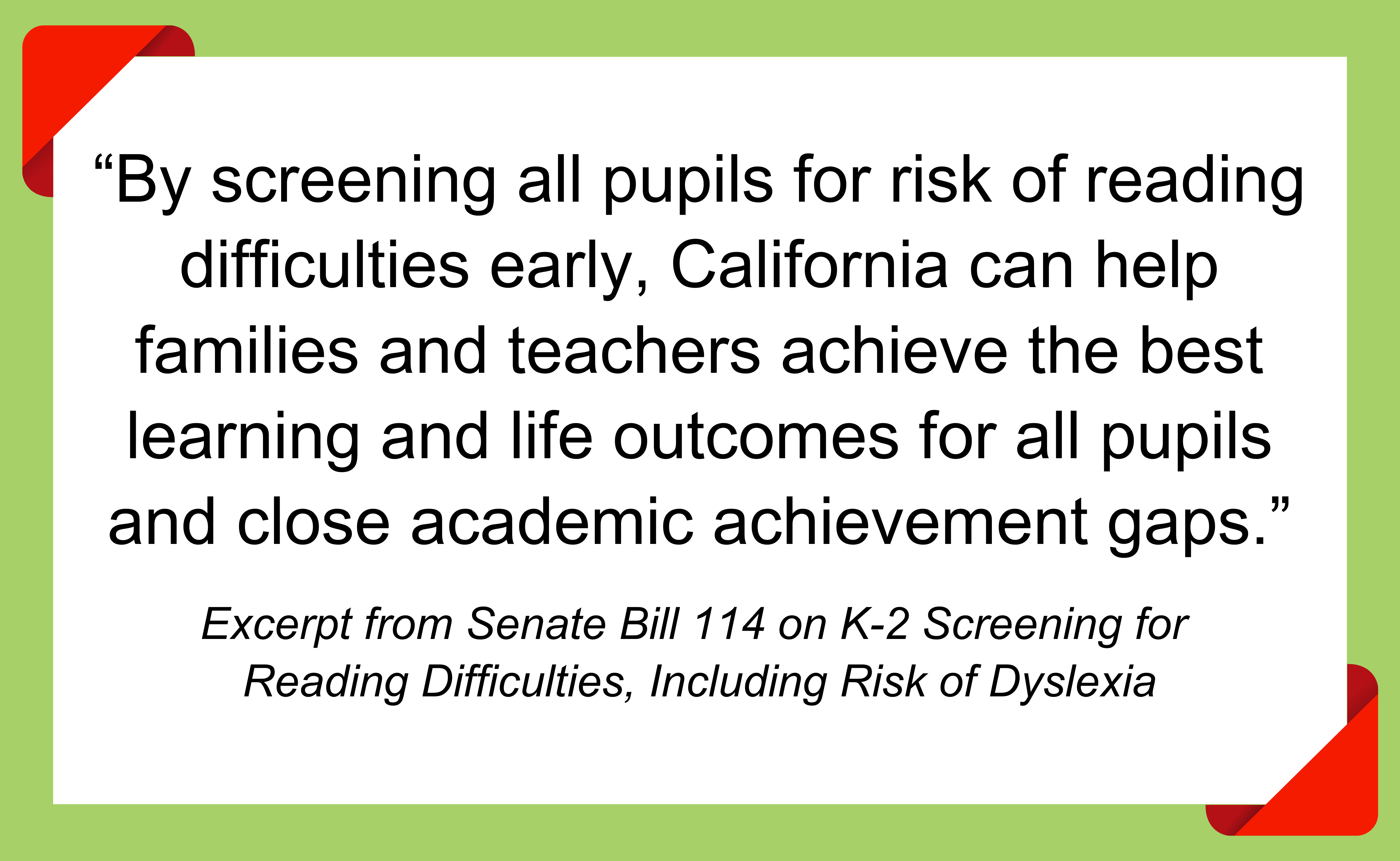Required K-2 universal screening is coming to California in the 2025-26 school year!

On July 10, 2023, Governor Newsom signed the Education Omnibus Budget Trailer Bill (Senate Bill 114) which included annual universal screening for reading difficulties, including risk of dyslexia, for California students in Kindergarten, Grade 1, and Grade 2. (You can find more background here and excerpted language from the bill here.)
Education leaders at the state and district levels are now preparing for the rollout of the state requirement. Read the paragraphs below for a brief explanation of universal screening for reading difficulties, including risk of dyslexia, and an outline of the next stages of implementation.
What is universal screening and why is it so important?
Universal screening refers to the process of assessing all students in a given grade level to identify those who may be at risk for reading difficulties, including risk of dyslexia. It involves brief tests of discrete skills and also incorporates additional supports for screening of multilingual learners. The goal is to catch potential reading issues early, before they become more pronounced and harder to address.
The ability to read is a fundamental skill in modern society and the gateway to all academic areas. Research from multiple scientific studies is unequivocal: early identification and intervention improves literacy outcomes for students at risk of, or with, dyslexia and other struggling readers. K-2 universal screening makes system-wide early intervention possible and is the first step in closing academic gaps, before students fall behind.
The latest in neuroscience research shows that the time from birth to age eight is a critical period for literacy development due to rapid brain growth and its response to instruction. These exciting advances in neuroscience also show that, with appropriate early identification and reading interventions, the unique identifiers in the brain can be altered to resemble the reading patterns seen in the brain of a person who does not have dyslexia. Learn more about universal screening and the evidence base here.
Does universal screening diagnose dyslexia?
Universal screening does not diagnose children as having dyslexia, and it does not determine special education eligibility. Screening identifies children who are at risk for developing reading impairments. It provides information about which children are likely to encounter difficulty learning to read and need targeted support. The goal is to reduce the prevalence of reading impairments, including dyslexia, by taking preventive actions in providing evidence-based interventions in response to screening, delivered in the general education classroom.
What is happening with the new screening law and when will screening begin?
Required K-2 universal screening is coming to California in the 2025-26 school year!
In January, 2024, the California State Board of Education appointed nine experts to the Reading Difficulties Risk Screener Selection Panel. The panel is currently working to devise a list of screening instruments developed for English-speaking pupils and students learning English. The panel has convened eight times during 2024 to engage in this work. Agendas and minutes from the meetings can be found here.
The legislation calls for the State Board of Education to publish the approved list of screeners before the end of 2024. Once the list is released, Local Education Agencies (referred to as “LEAs” and means school districts, county offices of education, direct-funded charter schools, and special education local plan areas, etc.) must formally adopt screening instrument(s) from those on the approved list by June 30, 2025.
LEAs will have until no later than the 2025-2026 academic year to begin annual screening of all pupils in Kindergarten, Grade 1 and Grade 2. Parents/guardians will receive the results of the screening, including information on how to interpret the results and the proposed supports and services for children identified as “at risk.” Proposed supports and services appropriate to the challenges identified in the screening process may include any of the following:
- Evidence-based literacy instruction focused on the pupil’s specific needs
- Progress monitoring
- Early intervention in the regular general education program
- One-on-one or small group tutoring
- Further evaluation or diagnostic assessment
Parents/guardians can opt-out if they do not want their child screened. There are also provisions for alternate procedures for English Learners who do not speak sufficient English to be screened using an English-language screening instrument.
What’s coming next?
DDCA was thrilled to see that the Governor’s budget included $25 million in funding for the implementation of universal screening. These funds are much needed as the legislation calls for, “guidance and resources for educators regarding how to administer screening instruments, interpret results, explain results to families, including in pupils’ primary languages, and determine further educational strategies, assessments, diagnostics, and interventions that should be considered and that are specific to each type of pupil result” (Senate Bill 114). To support LEAs with adoption and implementation of the screenings, the California Department of Education will add a dedicated web page to their website with information about the screening requirements, Frequently Asked Questions, and informational webinars. A Reading Difficulties Risk Screener Adoption Toolkit designed to guide LEAs in their review and adoption of screening instruments will also be published. DDCA will share more about the state-provided guidance and resources as information is released.
DDCA has advocated for universal screening since 2015 and, now, almost ten years later, it’s becoming a reality in California public schools! We look forward to the release of the approved list of screeners and hope to support stakeholders as they navigate the screener selection process and prepare for screening during the 2025-26 school year. Successful implementation depends on schools being prepared to provide appropriate follow-up interventions and support, as simply identifying at-risk students is not enough without a robust system in place to help them succeed.

Please follow DDCA to learn and support the implementation of this critical legislation! You can signup for DDCA emails by clicking here.



